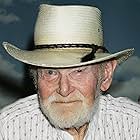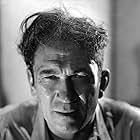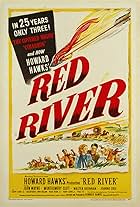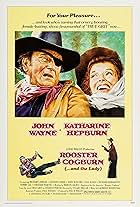A cavalry officer posted on the Rio Grande is confronted with murderous raiding Apaches, a son who's a risk-taking recruit and his wife from whom he has been separated for many years.A cavalry officer posted on the Rio Grande is confronted with murderous raiding Apaches, a son who's a risk-taking recruit and his wife from whom he has been separated for many years.A cavalry officer posted on the Rio Grande is confronted with murderous raiding Apaches, a son who's a risk-taking recruit and his wife from whom he has been separated for many years.
- Awards
- 1 nomination
Sons of the Pioneers
- Regimental Musicians
- (as Sons Of The Pioneers)
Ken Curtis
- Donnelly - Regimental Singer
- (uncredited)
Tommy Doss
- Regimental Singer
- (uncredited)
- Director
- Writers
- All cast & crew
- Production, box office & more at IMDbPro
Storyline
Did you know
- TriviaAccording to Maureen O'Hara in her autobiography, "Tis Herself", some stunt men died during the shooting of the film when they fell from their horses during a scene in the middle of a muddy river. Their bodies were allegedly never recovered.
- Goofs"You're in the Army Now" was written later (1917) than the time of the movie's actions.
- Quotes
[toasting]
Mrs. Kathleen York: To my only rival, the United States Cavalry.
- Alternate versionsAlso available in a computer colorized version.
- ConnectionsFeatured in Directed by John Ford (1971)
Featured review
As a writer, I find this to be the most honest and least pretentious of all John Ford's western films. His cavalry trilogy ended with "Rio Grande" (the others are "Fort Apache" and "She Wore a Yellow Ribbon: and it was also the first pairing of John Wayne with Maureen O'Hara, with whom he made five film appearances all told. The setting of the film is not glamorous by anyone's standards; it is dusty, hot, remote, a country for hard men and hard duty. The storyline has Wayne in command of a fort. When his son is assigned to him for training with other recruits, his wife, estranged for fifteen years, follows him--to try to meddle... The storyline makes clear that during the Civil War he refused to disobey orders to burn down her family's plantation; now she's come west, and he wants her back and want to instill his pride in and love for the cavalry in his son. There is rough humor in the film, changes to mind and body, learning to ride, standing up to the elements and to men, lessons the West can demand of anyone who comes there. nd after a plan of Wayne's to protect settlers against the Indians backfires, he has to risk everything to save his career and his command. The theme of the film is that any man has to dare and dream beyond old conventions and ideas in order to reach his best; and that goes for O'Hara as well. The film was directed by John Ford, with script by James Kevin MacGuinness..Bert Glennon's skilled B/W cinematography captures the bleak beauty of the spare semi-desert country, and admirably. Frank Hotaling did the production design and Victor Young contributed the score. In this feature's large cast were Wane, O'Hara. Claude Jarman Jr. of "The Yearling" as their son, Harry Carey Jr., Victor Maclaglen, J Carrol Naish, Chill Wills and many solid western performers. But the best thing to me about the production is the absence of any attempt to glamorize or apologize for the West. The men who rode for the cavalry lived with loneliness, the roughness of the country they patrolled and constant danger from those they opposed; this film makes it clear why men would do this for the meager pay they received; that it was the challenge they took up, as a way to use their abilities and emotional strength to the full. That is why I like this film the best of all of Ford's estimable works.
- silverscreen888
- Jul 8, 2005
- Permalink
- How long is Rio Grande?Powered by Alexa
Details
Box office
- Budget
- $1,214,899 (estimated)
- Runtime1 hour 45 minutes
- Color
- Aspect ratio
- 1.37 : 1
Contribute to this page
Suggest an edit or add missing content







































